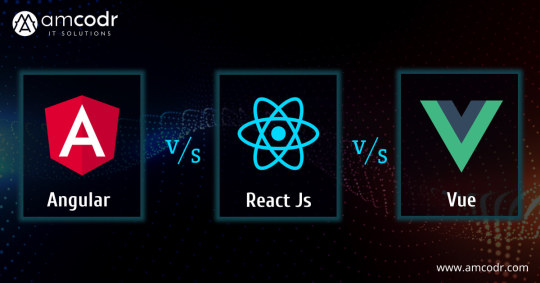#angular vs react
Text
#angular#web developers#reactjs#nodejs#construction#technology#technolovers#angular js#angular developers#angular vs react#angular prevent keyup only 4 characters in angular 2#angular 14
2 notes
·
View notes
Text
"Curious about which framework to choose in 2024? Our latest blog compares Angular vs React, diving into their key features, performance, and use cases to help you make the best decision for your next project. Discover which framework suits your development needs!"
0 notes
Text
Choosing the right JavaScript frameworks is a real confusion. Especially when you have a lot of options that are super resourceful and capable of facilitating the project requirements. But choosing the one for the right set of projects demands knowledge of several critical aspects. We have covered some of the essential points in this post by making a fair comparison of Angular vs React. Both can be the right frameworks that are great for building modern mobile and web applications with component-based architectures. Choose the one that best suits your project functionalities, preferred programming paradigm, project workflows, and the skills of your developers.
0 notes
Text
React vs Angular: Which JS Framework is Better for Front-end in 2024?
Dive into the world of front-end development in 2024. Check out a detailed comparison of React vs Angular and discover the features, performance, and community support of each framework, helping you make an informed choice.
0 notes
Text
0 notes
Photo

Angular or React? Let's see which is better programming platform in 2023.\
https://www.softqubes.com/blog/angular-vs-react/
1 note
·
View note
Text
#angular developers#angular#angular js#angular14#angular 15#how to hire angular developers#technology#web developers#angular vs react#nodejs
1 note
·
View note
Photo

Which has great performance? Angular or React?
Since Angular has two way data-binding, every binding has a watcher to tracker modifications whereas React has single data-binding.
As well Angular uses regular DOM and React uses virtual DOM.
Due to bidirectional binding and regular DOM, Angular has performance issues and React has great performance than Angular.
Hence React is the best front-end technology for developing dynamic web apps.
But it does not conclude that React is better than Angular. To know the full differences between Angular and React, check our article.
https://www.infinijith.com/blog/framework/angular-versus-react
#angular vs react#angular versus react#angular vs react performance#angular performance vs react#angular vs react 2022#difference between angular and reactjs#angularjs vs reactjs
0 notes
Link
As front-end development revolves around anything that we create that the users of that specific app see. To put it plainly, it is everything to do with the UI of the app.
So, here we discuss two very popular front-end development tools i.e. React and Angular among web software development companies How do Angular, a JavaScript-framework, and React, a JavaScript-library, compare with each other?
#angular vs react#react framework#angular framework#hire angular development company#react developers
0 notes
Text
Angular vs. Other Frameworks: Why It’s the Best Choice for Your Mobile App

In the modern digital age, developing mobile apps has become essential for driving business success. The competition in the mobile app market is intense, and picking the right framework can significantly impact your app’s performance, scalability, and overall success. Among the most popular frameworks are Angular, React, and Vue.js, but Angular mobile app development stands out for its comprehensive tools, advanced features, and support for complex projects. In this article, we’ll explore why Angular is the best choice for your mobile app development projects.
What is Angular?
Angular, an open-source front-end framework created by Google, was first introduced in 2010. Since then, it has evolved significantly, with Angular 2+ being a total overhaul of the original AngularJS. It’s written in TypeScript, offering developers a static type system that makes coding easier and less error-prone. With its component-based architecture and powerful development tools, Angular provides a robust environment for building dynamic, scalable, and secure mobile applications.
Importance of Frameworks in Mobile App Development
Frameworks are crucial in streamlining mobile app development tasks. They provide a structured foundation for building apps, reducing the need to write repetitive code and streamlining the development process. Frameworks like Angular, React, and Vue.js offer varying degrees of flexibility, ease of use, and performance optimization, making it critical to choose the right one based on the app’s requirements.
Angular vs. React
One of the most common comparisons in mobile app development is between Angular and React. React, developed by Facebook, is widely used for creating user interfaces, particularly single-page applications. Although both frameworks are highly capable, Angular offers a broader range of built-in functionalities, including modules for routing, forms, and HTTP communication. React, on the other hand, often requires third-party libraries to achieve the same functionality, which can increase the complexity of a project.
While React offers flexibility and a shorter learning curve, Angular’s opinionated architecture and robust tools make it a more suitable choice for large-scale and complex mobile app development projects.
Angular vs. Vue.js
Another widely used framework is Vue.js, appreciated for its straightforward approach and seamless integration. It’s often favored by small teams or individual developers for smaller applications. However, when it comes to handling more complex, enterprise-level applications, Angular takes the lead. Vue lacks some of the advanced features that Angular provides, such as dependency injection and comprehensive tooling, making it less suitable for large projects requiring scalability and maintainability.
Core Features of Angular for Mobile App Development
Component-Based Architecture: Angular’s component-based architecture enables developers to create reusable components, reducing redundancy and improving efficiency in development.
TypeScript Support: TypeScript, being a superset of JavaScript, introduces static typing and other advanced features, making debugging easier and code more reliable.
Two-Way Data Binding: This feature allows changes in the user interface to automatically update the underlying data model and vice versa, ensuring real-time synchronization.
Dependency Injection: Angular’s dependency injection system improves modularity and scalability, allowing components to be easily managed and tested in isolation.
Why Angular is Ideal for Complex Mobile App Projects
When managing a large-scale mobile app development project, Angular shines due to its modular development structure. By breaking the app into multiple modules, Angular makes it easier to manage, update, and scale complex applications over time. This is especially useful for projects that involve multiple teams working on different parts of the app, ensuring that changes in one module do not interfere with others.
Security in Angular
Security is a significant concern in mobile app development, and Angular provides several built-in features to enhance app security. It supports HTTPS communication and offers robust authentication mechanisms, including OAuth, JSON Web Tokens (JWT), and more. By incorporating these security protocols, Angular ensures that user data remains protected throughout the app’s lifecycle.
Performance Optimization with Angular
Angular’s Ahead-of-Time (AOT) compilation ensures that templates and components are pre-compiled, reducing the app’s initial load time. Additionally, Angular’s Change Detection feature minimizes unnecessary updates, optimizing the app’s performance, especially for large-scale projects.
Scalability of Angular for Growing Apps
One of Angular’s strongest attributes is its scalability. As mobile apps grow in complexity and usage, Angular’s modular architecture allows for easy updates and maintenance without disrupting the overall structure. Whether you’re building a small app or a massive enterprise solution, Angular can scale seamlessly to meet the app’s demands.
Support for Progressive Web Apps (PWAs)
Angular is also a popular choice for building Progressive Web Apps (PWAs), which offer users an app-like experience on the web. With PWA support, Angular enables developers to create fast, reliable, and engaging web experiences that work seamlessly across all devices.
Cross-Platform Development with Angular
Another significant advantage of Angular is its cross-platform development capabilities. Angular can be integrated with frameworks like Ionic to build hybrid mobile applications, providing a single codebase that works across multiple platforms, including iOS and Android.
Community and Ecosystem Support
Angular boasts one of the largest and most active developer communities in the tech world. With countless resources, tutorials, libraries, and tools available, developers can easily find solutions to common problems, making it easier to build and maintain Angular apps over the long term.
Conclusion
In conclusion, Angular stands out among other frameworks due to its robust set of features, scalability, and security. For mobile app development projects, particularly those that require handling complex functionalities and large datasets, Angular provides an ideal solution. Its modular architecture, cross-platform capabilities, and extensive community support make it the best choice for developing dynamic, scalable, and secure mobile applications.
FAQs
What sets Angular apart from other mobile app development frameworks? Angular’s component-based architecture, TypeScript support, and built-in security features make it ideal for large-scale mobile apps.
Is Angular suitable for small-scale mobile app projects?
Yes, Angular can be used for small-scale apps, though its full potential is realized in complex, enterprise-level applications.
Can Angular be used for both web and mobile apps?
Absolutely! Angular supports both web app development and cross-platform mobile app development through integration with tools like Ionic.
How secure is Angular for mobile app development?
Angular offers strong security measures such as HTTPS for secure communication, various authentication mechanisms, and built-in safeguards to defend against common threats like XSS attacks.
Is Angular easy for new developers to learn?
Angular has a steeper learning curve compared to frameworks like React or Vue.js, but its comprehensive documentation and community support make it accessible for new developers.
#Angular mobile app development#best mobile app frameworks#Angular vs React comparison#mobile app scalability#cross-platform app development#front-end frameworks for mobile#mobile app performance optimization#Angular app security#mobile app user experience#benefits of Angular for mobile#Angular vs Vue for mobile apps#mobile app development trends#Angular for enterprise apps#mobile app support frameworks#choosing the right mobile framework
0 notes
Text
Angular vs. React vs. Vue: Which Framework Dominates in 2024?

In 2024, the battle of JavaScript frameworks continues to be dominated by Angular vs. React vs. Vue, each bringing unique strengths to front-end development. Angular, backed by Google, remains a powerhouse with its comprehensive feature set and strong enterprise support. It excels in complex, large-scale applications requiring robust architecture and TypeScript integration.
React, maintained by Facebook, retains its popularity for its flexibility and virtual DOM efficiency, making it ideal for building interactive user interfaces. Its vast ecosystem and component-based structure empower developers to create scalable applications swiftly.
Meanwhile, Vue.js, known for its simplicity and ease of integration, has steadily gained ground with its progressive framework approach. It appeals to developers seeking a lightweight yet powerful solution for building modern UIs and single-page applications.
The decision between Angular, React, and Vue hinges primarily on the specific project demands, the proficiency of the team, and the scalability requirements. While Angular suits enterprise-grade applications, React’s flexibility caters well to diverse project scopes, and Vue’s simplicity attracts startups and small teams aiming for rapid development. In 2024, these three remain the cornerstone choices in the ever-evolving landscape of front-end development.
#Angular vs. React vs. Vue#reactjs#softwaredevelopmentcompany#appdevelopment#custom application development company
0 notes
Text

This informative infographic highlights the key differences between React and Angular, two popular JavaScript frameworks used for building modern web applications. Explore this visual guide to help you make an informed decision about which framework to choose for your next project.
0 notes